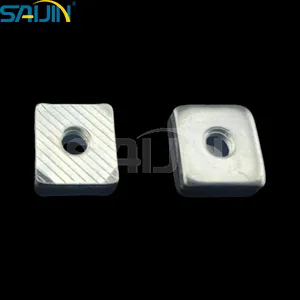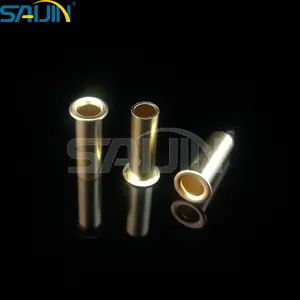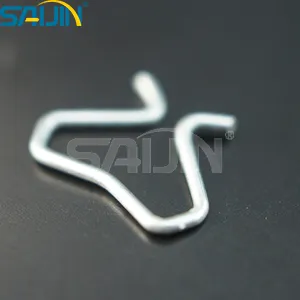Flip over any common electrical plug, and you'll likely see pins with a distinctive golden hue. That's brass, an alloy primarily of copper and zinc. It's not just a random choice; brass is meticulously selected as the material for plug pins because it uniquely balances several critical engineering and economic requirements. Let's delve into the key reasons:
1. Electrical Conductivity
The Need: Plug pins must efficiently carry electrical current from the socket to your appliance with minimal resistance, reducing energy loss (as heat) and voltage drop.
Brass Solution: While pure copper boasts the highest conductivity among common metals, brass offers a highly respectable level. Copper content in typical plug brass alloys (around 60-70%) ensures conductivity remains high enough for standard household currents (up to 13A in many regions). Crucially, it offers a better overall balance than cheaper alternatives like steel.
2. Mechanical Strength & Durability
The Need: Pins experience significant physical stress. They must resist bending when inserted or removed, withstand clamping forces from socket contacts, endure impacts if dropped, and maintain their shape over thousands of insertion cycles without fracturing.
Brass Solution: Brass is significantly harder and stronger than pure copper. This inherent stiffness prevents pins from bending or deforming easily during use, ensuring a reliable connection and preventing plug wobble or failure. Its good springiness (modulus of elasticity) also helps pins maintain contact pressure within the socket.
3. Corrosion Resistance
The Need: Pins are exposed to air (oxygen), moisture (humidity, spills), and sometimes even mild chemicals. Corrosion (like oxidation or tarnishing) increases electrical resistance, causes overheating, and can physically bind pins in sockets.
Brass Solution: Brass naturally forms a protective oxide layer on its surface that inhibits further corrosion. This layer is relatively stable and conductive compared to the flaky rust of iron or steel. It performs well in typical indoor environments, offering long-term reliability. (Note: In harsh marine environments, specific brass alloys or plating might be needed).
4. Machinability
The Need: Plug pins are produced in enormous quantities. The material must be easy and fast to machine (cut, stamped, formed) into precise, complex shapes without excessive tool wear, keeping production costs down.
Brass Solution: Brass is renowned for its excellent machinability. It cuts cleanly, produces small chips that break away easily, causes relatively low tool wear, and can be formed into intricate pin shapes (like the flanged ends for better socket contact) at high speeds. This manufacturability is a huge economic advantage.
5. Cost-Effectiveness
The Need: While performance is paramount, plug pins are commodity items. The material cost must be reasonable relative to its performance and the overall cost of the plug.
Brass Solution: Brass hits the sweet spot. While more expensive than steel, its superior conductivity and corrosion resistance make it essential. It's significantly cheaper than high-conductivity alternatives like pure copper (which is softer and less strong) or silver (used only for very high-end contacts). The combination of good performance, durability, ease of manufacturing, and reasonable material cost makes brass the most cost-effective solution overall.
Conclusion
Brass isn't chosen for plug pins by accident. It's the result of careful engineering evaluation. Its unique blend of good electrical conductivity, high mechanical strength, inherent corrosion resistance, excellent machinability, and overall cost-effectiveness makes it the unrivaled material for this critical, everyday component. The next time you plug something in, take a moment to appreciate the golden alloy silently and reliably delivering power, thanks to this perfect balance of properties.
FAQ
Q: Can other metals be used instead of brass for plug pins?
A: Yes, some other metals like copper or bronze can be used. However, copper is softer and more expensive, and bronze may not have the same combination of electrical conductivity and machinability as brass.
Q: Does the zinc content in brass affect its performance as a plug pin?
A: The zinc content does influence the properties of brass. A higher zinc content can increase strength but may slightly reduce electrical conductivity. Manufacturers typically use a brass alloy with an optimal zinc content to balance these properties.
Q: How long do brass plug pins last?
A: With normal use and proper care, brass plug pins can last for many years. Their corrosion resistance and mechanical strength help them withstand the test of time, though factors like excessive force or exposure to harsh environments can shorten their lifespan.
Q: Are brass plug pins safe?
A: Yes, brass plug pins are safe when manufactured to standard specifications. They conduct electricity efficiently and are strong enough to prevent accidental damage that could lead to electrical hazards.











